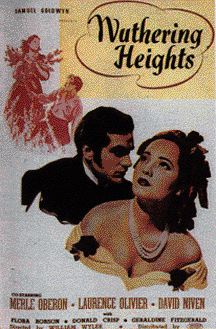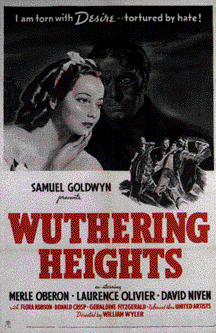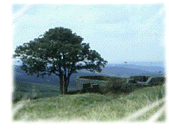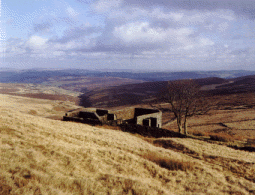| An Introduction to the novel from 'The Irish Times' Discussion Questions

Notes on the
1939 Film Version regarded as one of the great films, if not particularly true to the
text!

Web Links
Wuthering Heights - A page
created by students who studied this text. Their themes page makes a good
start to a discussion of the novel.
The
Penguin Readers Guide to Wuthering Heights - Another good place to begin your thinking
about the novel.
The
Emily Bronte Page - This page is devoted to providing information and access to
information about Emily Bronte It contains links to sources of information on the Web
about Emily, her life and work.
Remembrance
- A poem by Emily Bronte with parallels to the novel.
A
Web guide to Emily Bronte
The
Bronte Sisters Web - A detailed Japanese site in tribute to the sisters (it's written
in English)
Bronte Country
- The landscape that frames the novel; this is really a site that specialises in
accommodation in the area.
Lynns World of Wuthering
Heights - Mainly devoted to the various film versions of the novel.
Subscribe to the Bronte
Mailing List
|
|
‘My love for
Heathcliff resembles the eternal rocks beneath … I am Heathcliff – he’s
always, always in my mind – not as a pleasure, any more than I am always a pleasure
to myself – but as my own being’
Emily Brontė’s only novel appeared to mixed reviews in 1847,
a year before her death at the age of thirty. In the relationship of Cathy and Heathcliff,
and in the wild, bleak Yorkshire Moors of its setting, Wuthering Heights creates a
world of its own conceived with a disregard for convention, an instinct for poetry and for
the dark depths of human psychology that make it one of the greatest novels of passion
ever written.
'Wuthering Heights was hewn in a wild workshop, with simple
tools, out of homely materials. The statuary found a granite block on a solitary moor
… with time and labour the crag took human shape; and there it stands colossal’
– Charlotte Brontė
An Introduction to the Novel from the "Irish Times'
[The Irish Times]
Tuesday, August 4, 1998
She never married, never it seems experienced a --------grand passion. Yet Emily Brontė,
who died 150 years ago this year, created the ultimate tale of destructive love. Eileen
Battersby is bowled over by the emotional power of Wuthering Heights.
It is the story which has become synonymous with romance and wild, doomed passion. More
than 150 years after its publication, poet Dublin Luxury Emily Brontė's only novel
Wuthering Heights Apartments (1847) remains one of the most famous and --------popular
literary novels ever written. Drawing on the better elements of the Gothic and Romantic
traditions, it is also one of the most consistently well-regarded achievements of world
literature, a sophisticated masterwork of narrative technique, muscular lyricism and
astute psychological observation.
The contradictions and ironies it contains are many-fold. Brontė's claustrophobic tale of
enduring love is equally a saga of crazed extremes, vicious cruelty and ultimately, a
salvation of sorts. At its heart are two tormented souls; the wilful, hysterical Catherine
Earnshaw and Heathcliff, a dark, romantic hero of origins unknown whose existence is
sustained by his unrelenting desire for revenge on his loved one's family and pretty much
everyone else.
Rage is as natural to them as breath itself, and all who come within their orbit suffer
the effects of their tempestuous exasperation. Edgar, Catherine's husband, is frightened
of her rages. What appears to be an asexual passion is in fact highly sexually charged.
Images of windows, doors and keys abound. Is this a case of childhood friends incapable of
progressing to adult love, or are Brontė's definitive romantic lovers merely
highly-strung, sexually-repressed misfits? And if so, why? They appear to level their
anger and frustrations at everyone; at each other, and eventually at themselves.
Does Catherine die from thwarted love, or is it childbirth complications? We do know that
Heathcliff wills himself to die because, as he tells Nelly Dean, "the entire world is
a dreadful memoranda that she did exist and that I have lost her". Surely obsessional
love has never been portrayed as so dangerous, so shocking, so degrading and yet so
compelling -and all in an early Victorian novel, completed three years be- fore the birth
of Thomas Hardy.
Emily Jane Brontė, the fifth child of an Irish clergyman who became the curate of
Haworth, Yorkshire, was born on July 30th 1818. Aside from some brief periods spent away
at school and later abroad, in Belgium, she spent her entire short life in Yorkshire and
was passionately devoted to the rugged moors she regarded as her home and life-source. The
remote parsonage helped make the Brontė children, who were surrounded by books and
influenced by a quiet Cambridge graduate father who was committed to education, unusually
intellectually self-sufficient.
All of them, particularly Emily, lived in their imaginations. They invented their own
fictional worlds; Charlotte and Branwell concentrated on Angria, while Emily and Anne
created the Gondal cycle. Their intensely imagined lives were always at the mercy of ill
health. Death held little novelty for them. The children's mother died in 1821, when Emily
was three, leaving the children to be raised largely by their aunt, Elizabeth Branwell, a
staunch Methodist. The two eldest girls died at the ages of 11 and 10 respectively. Emily
herself was dead by the age of 30.
Emily Brontė never married, nor does she appear to have had any romantic attachments.
`Remembrance', a beautiful, formal lament which begins "Cold in the earth - and the
deep snow piled above thee,/ Far, far removed, cold in the dreary grave!/ Have I forgot,
my only Love, to love thee,/ Severed at last by Time's all-severing wave", for all
its romance, is believed to have been inspired by the death of her eldest sister. As well
as suffering frequent bouts of illness, Brontė was solitary to the point of being
abrasively anti-social and at her happiest with her dogs and nature. People did not
interest her. Her poetry is intensely personal and burns, as does her strange, remarkable
novel, with complex depths of passion.
At a time when many women poets were writing narrative verse directed at specific events,
Brontė's remained introspective, availing of physical images from the natural world:
"Death! that struck when I was most confiding/ In my certain faith of joy to be - /
Strike again. Time's withered branch dividing/ From the fresh root of Eternity!"
(From `Death', 1846.) Possibly her strongest pieces are the Gondal poems, whose internal
tensions are obviously drawn from her emotions, yet grafted on to her invented characters.
SIN and damnation are much in evidence throughout Wuthering Heights and the presence of
Joseph, the sadistic old Biblebasher who acts as a demented chorus, suggests that Brontė
was well aware of the fundamentalist aspects of the Methodist tradition her father had
been born into - beliefs her Aunt Elizabeth continued to abide by. This original, timeless
novel of extremes, with its conflicting tensions of obsessive love and hate, draws much of
its impact from the inspired juxtapositioning of the surreal - such as the dead child at
the window demanding to be let in, and the reports of ghosts walking hand in hand - with
careful attention to domestic detail.
Meals are prepared, fires are lit, horses fed and sheep protected against the storms.
People are treated less well. The genteel luxury of Thrushcross, of which the young
Catherine and Heathcliff steal a glimpse when clinging to a window ledge - as the boy
reports to Nelly, "ah! it was beautiful - a splendid place carpeted with crimson, and
crimson-covered chairs and tables, and a pure white ceiling bordered by gold, a shower of
glass-drops hanging silver chains from the centre" - does not survive Edgar Linton.
Lockwood is driven from the cold of Thrushcross to the warmth of Heathcliff's Wuthering
Heights, where large fires are as much in evidence as seething tensions.
Brontė carefully tempers the extremes with normality. Nelly Dean has chores to attend to,
such as knitting and making Christmas cakes. Dark and light; storm and calm; heat and
cold; weak and strong; love and hate; genteel and primitive; the moral versus the amoral
are all major thematic devices in the novel, which is earthbound and unearthly and
generational.
Ironically, it is an act of kindness which instigates the spiral of hate directing the
story. Mr Earnshaw sets off on a journey, promising his children gifts. On his return he
presents a young boy he has rescued. The father's humanity brings out the worst in his
children; his son Hindley despises the newcomer as a rival, and proceeds to brutalise the
foundling, while the high-spirited, spoilt Catherine claims Heathcliff as her own. His
arrival heralds the tearing apart of the Earnshaw family, and in time also destroys the
Linton clan.
Brontė begins her story near its conclusion and calls upon two vastly different
narrators. Lockwood is the outsider. Interestingly, his decision to rent Thrushcross
Grange appears to have been motivated by his failure to respond to a potential romance.
Having become interested from afar in a woman, he flees on seeing his interest returned, a
reaction which causes him to shrink "icily into myself, like a snail, at every glance
retired colder and further; till finally the poor innocent was led to doubt her own
senses, and . . . persuaded her mamma to decamp". He seems a lazy, soft, indolent
fellow and his noncommittal attitude to love contrasts with Heathcliff's tormented and
tormenting approach.
Nelly Dean, the main narrator, is an articulate, pragmatic countrywoman with a liking for
books which helps explain her narrative skills. Most important of all, she knows these
people, was once a playmate of Hindley and later tended Catherine and Heathcliff through
childhood illnesses. Long familiar with their personalities, she feels free to chide them.
The consummate observer, she is opinionated yet surprisingly objective and must be
considered a reliable narrator. Much of what she describes, often laconically, is beyond
belief - and yet having witnessed the situation developing over the years, she can control
her judgment of both behaviour and events.
But by the end of the novel, even Nelly is forced to challenge Heathcliff when he
describes his antics at Catherine's grave. "Were you not ashamed to disturb the
dead?" Heathcliff's response is governed by the bizarre logic by which he lives.
"Disturbed her? No! she has disturbed me, night and day, through 18 years -
incessantly - remorselessly. . . I have strong faith in ghosts; I have a conviction that
they can, and do exist among us."
Brontė's handling of Heathcliff, one of literature's most seductive monsters, is superb.
"Is Mr Heathcliff a man? If so is he mad?" asks Isabella Linton, who marries
him. She discards her wedding ring, yet seems prepared to go back to him: "He shall
buy another, if he gets me back again". In her flight from Heathcliff, she notices
little Hareton "hanging a litter of puppies from a chairback". Having only
partly overheard Catherine's famous speech in which she announces "It would degrade
me to marry Heathcliff, now" he leaves before she adds, ". . . he shall never
know how I love him; and that, not because he's handsome, Nelly, but because he's more
myself than I am. Whatever our souls are made of, his and mine are the same."
THREE years later he returns having acquired some polish, his education a mystery while
his sullen anger is obvious to all. His subsequent performance, including his treatment of
his hapless wife and son, is barbaric. Yet somehow Brontė manages to keep our sympathy
alive. It is no coincidence that Heathcliff, madman, crazed lover and bad father, delivers
many of the novel's most poetic declarations; "My soul's bliss kills my body."
The dialogue throughout is outstanding; Heathcliff moves convincingly between ugly threats
and black asides, punctuated by the helpless rage and regret summoned when lamenting his
dead love. Common sense is a feature of Nelly's reportage, while even at her most
distressed Isabella remains true to her class - as does the stiff, nosy Lockwood. Joseph's
incoherent mutterings in dialect add to the atmosphere.
In recalling her sister's death on December 19th 1848, Charlotte Brontė observed: "I
looked on her with an anguish of wonder and love. . . Stronger than a man, simpler than a
child, her nature stood alone." The creator of Wuthering Heights remains a mystery -
as does the book. Is it a romantic melodrama? Or a dense morality play? Is she attempting
to show that romantic passion is a destructive delusion? Is there a moral to be found in
the almost naļve resolution achieved by Hareton and young Cathy, the children of the
brother and sister damaged by Heathcliff's arrival? Or is the narrative merely reaching
full circle and is the second Catherine, now Earnshaw again albeit by marriage, fulfilling
the romance denied her mother? After all, this second-generation Catherine does succeed in
taming her savage. Immortalised in our memories as a love story, it is even more
forcefully a superlative study of emotional turmoil. Perhaps Brontė's ultimate
achievement in Wuthering Heights is locating chaotic passions within the context of
ordinary life.
Copyright: The Irish Times
Discussion
Questions from the Penguin Reading Guide
1) Why do you think Emily Brontė chose to
unfold the story through the secondary sources of Ellen's narrative, Mr. Locoweed's two
visits, and Catherine's diary? How would the story have differed if it had been told
chronologically? Do you trust the narrators' versions of the events that took place? Or
are they, from time to time, a bit unreliable?
2) Compare Catherine's love for Heathcliff with her love for Edgar: What are the defining
characteristics of each relationship? Do you think Catherine regrets her choice of
husband?
3) When Heathcliff visits Catherine for the last time before she dies, she says to him,
"You have killed me--and thriven on it, I think." Nearly twenty years later,
when Heathcliff is approaching death, he says, "I have to remind myself to
breathe--almost to remind my heart to beat!" Did Heathcliff and Catherine believe the
only way they could be together was in death? Did they, somehow, will themselves to die?
4) The characters in the novel have a great capacity for violence and hatred, and revenge
is one of Heathcliff's greatest motivations. Is Heathcliff justified in the revenge he
takes on Hindley? Do you think Heathcliff's childhood experiences at Wuthering Heights
contributed to his monstrous behavior as an adult?
5) One critic stated that Wuthering Heights is "truly a novel without a hero
or heroine." What do you think of this statement? Is Heathcliff a hero or a villain?
6) Wuthering Heights is considered by many to be one of the greatest romances in
literature. Do you agree with this? What is your definition of a romantic novel? Must a
great romance have a happy ending?

Top Withings (above) from the Bronte Country
site Although being at odds with her description in the novel Wuthering Heights, Top Withins is popularly credited as
being Emily Bronte's setting for Heathcliffe's moorland farmstead. Whether or not this
desolate ruin on the moors above Haworth
is the genuine article hardly seems to matter to most visitors; the setting is romantic
enough to have appeared in several film versions and paintings, and, even on a fine day,
it is hard not to be impressed by the wildness of the place. Well worth a visit - for
Bronte enthusiasts and philistines alike...

|